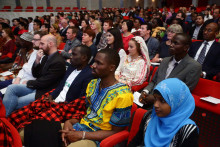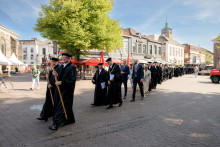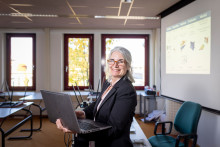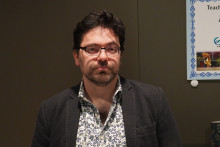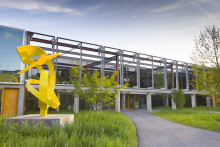'This is all about you, students. No students, no university. I´m happy there is such a diversity of cultures in this room. We need diversity in students to make people aware of cultural diversity in our teaching,' began Professor Tom Veldkamp, Dean of ITC (alias Faculty of Geo-Information Science and Earth Observation at the University of Twente).
Ethical research & best paper by a PhD
In his welcome speech, Professor Veldkamp talked about the importance of human impact of technology, pointing out that a lot of personal information can be deducted even from simple data constantly collected by ever-present smart phones. 'When is it my information and when does it become public domain? This issue isn´t defined yet and it is one of the examples why we want to focus on ethically oriented research at ITC.'
Professor Veldkamp also presented the ITC Publication Award for best scientific paper by a PhD student. This year the award and a €1000 price went to Mitra Shariati Najafabadi, who was managing a research describing migration of birds from the Netherlands to Russia.

The best MP in Kenya
The Schermerhorn lecture, named after the founder of ITC, was given by a highly accomplished ITC alumnus, Dr Wilber Ottichilo, who is a member of Kenyan parliament and has been recently voted the best MP in Kenya. 'I´m delighted and humbled to be back home at ITC. I want to share with you what I´ve been able to do since leaving ITC and show you how important it is to use geo-information in planning and decision making.'
As a seasoned politician, Ottichilo spoke of his experience in Emuhaya constituency in Western Kenya. 'In Emuhaya we´ve been able to set up the first GIS/ICT center in Kenya. We´ve been able to map all public facilities thanks to geo-information, and therefore make appropriate decisions. We have made maps of all schools, roads, police posts, crime prone areas and more.'
Geo-information improves lives
Based on Ottichilo´s explanation, such maps can be used to significantly improve people´s lives: 'We mapped availability of electricity in all public education facilities. In 2014, 35% of schools didn´t have any electricity, but we found out and in 2015 there is a supply of electricity in 100% of schools. Moreover, it was decided that no child should walk more than 1 kilometer to reach a primary school. We looked at the data and indentified areas that needed more schools. We did the same with health centers, roads and police posts. Before, politicians decided where to build, now data tells us where exactly to place new facilities.'
Advice for students
Ottichilo stressed that no decisions were made without the involvement of the general public in Emuhaya. In every case, the locals decided where precisely should a new road or a facility be built. 'You need to be involved in the community,' Ottichilo advised the students. 'Scientists don´t know how to communicate, but you need to explain complicated things in simple words, so everybody is aware of what you are doing. Take off your suits and go to the village and be with the people. Do something people will see and that will transform their lives.'
Ottichilo also encouraged all new students to take a full advantage of their time at ITC: 'ITC is a place where you turn from a village boy into a global person. Be open, don´t stay in your rooms. You will not find such a diversity anywhere else.'


